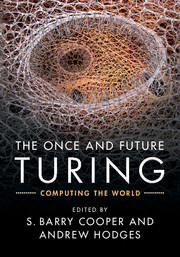Book contents
- Frontmatter
- Contents
- Contributors
- Preface
- Introduction
- Part One Inside Our Computable World, and the Mathematics of Universality
- Part Two The Computation of Processes, and Not Computing the Brain
- Part Three The Reverse Engineering Road to Computing Life
- Part Four Biology, Mind, and the Outer Reaches of Quantum Computation
- Part Five Oracles, Infinitary Computation, and the Physics of the Mind
- Afterword
Afterword
Published online by Cambridge University Press: 05 March 2016
- Frontmatter
- Contents
- Contributors
- Preface
- Introduction
- Part One Inside Our Computable World, and the Mathematics of Universality
- Part Two The Computation of Processes, and Not Computing the Brain
- Part Three The Reverse Engineering Road to Computing Life
- Part Four Biology, Mind, and the Outer Reaches of Quantum Computation
- Part Five Oracles, Infinitary Computation, and the Physics of the Mind
- Afterword
Summary
The world is open for fresh ideas about fundamentals of mind, matter, information, space and time. Turing made just such a plunge in 1936, undeterred by being young and new to the field. Compared with the carefully delineated and trained trajectory expected of modern research students, his d ébut seems amazing. It was extraordinary even then, being without precursor papers or collaborators. But, of course, the young Turing was not alone: Einstein and Eddington, von Neumann and Russell, had spoken volumes to his receptive mind, and he had worked hard through Cambridge mathematics. He was justifiably proud of his breakthrough as a 24-year-old, and correspondingly interested in spotting new youthful talent. His highly unconventional running with young Garner had a parallel: a wish to hand on scientific inspiration to a young person, perhaps in a way quite outside the standard academic framework. This Alan Turing indeed achieved, to some extent, but maybe he has still more to do.
These essays themselves, with their unusual connections and incomplete conclusions, might stimulate new minds with new thoughts. Miguel Walsh, winner of the 2014 Ramanujan Prize, explains how he learned about outstanding problems in mathematics from the Internet, while otherwise isolated in Argentina. We are reminded of how Srinivasa Ramanujan himself emerged from isolation, in the very India where Alan Turing was conceived, through the old mechanism of print and post offices. In the last century, the universal machine has greatly accelerated and amplified such global interaction. Who knows! The history of science depends on the strangest encounters of human brains. The once and future Turing both take their life from the unpredictable and sometimes highly inconvenient magic of human thought.
- Type
- Chapter
- Information
- The Once and Future TuringComputing the World, pp. 379Publisher: Cambridge University PressPrint publication year: 2016
- 1
- Cited by



